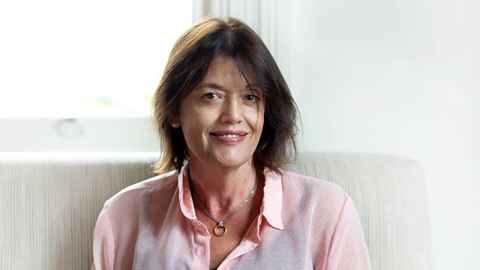Charlotte Grimshaw: human stories in the AI age
5 November 2025
Guest column: Alumna Charlotte Grimshaw reflects on the impacts of AI on authors.

In 2025, I was elected president of honour of the New Zealand Society of Authors. This was very nice, but the role came with a significant obligation. I was required to give the Janet Frame Memorial Lecture, which has the aim of delivering an overview of the state of the nation for New Zealand literature. It didn’t seem too onerous a task until I realised my lecture would have to acknowledge the existence of AI.
Up until that point, I’d been dealing efficiently with AI: by ignoring it. I scrolled past news articles, refused to engage at all. It seemed too depressing, the prospect that soulless machines could threaten human creativity.
In March, I discovered that my books are among titles that have been used in LibGen, an illegal pirate site AI companies have been using for machine learning. I joined other writers protesting to Meta, and heeded the New Zealand Society of Authors advice, which includes joining an international class action lawsuit to protect copyright, adding a No AI Training notice on the copyright pages of books, and certifying that my books were written by a human.
Forced to face the problem, I buckled down and asked an experienced UK publisher for his take. His response was that, like me, he finds the subject “a horror show”, involving loss of copyright and jobs, not to mention the vast amount of energy required for AI generation. He also said, “It’s not all it’s cracked up to be.”
So far, AI makes stuff up (we’ve all noticed AI summaries that are surreally wrong), it’s nowhere near as useful as a human, it’s unaccountable and is a curse for artists. There is huge anxiety around copyright, and an awareness that the rapacious entities pushing the technology are not socially responsible, ethical or concerned about our planet’s finite resources.
It’s a typically ironic human situation: we’re up against the latest
self-made nightmare knocking at our door.
In May, 400 British artists wrote to their prime minister urging him to protect copyright. As they put it, “We will lose an immense growth opportunity if we give our work away at the behest of a handful of powerful overseas tech companies, and with it our future income, the UK’s position as a creative powerhouse, and any hope that the technology of daily life will embody the values and laws of the United Kingdom.” Artists all over the world are now raising the same concerns.
The New Zealand government’s approach to AI is supposedly “light-touch, proportionate and risk-based”. It doesn’t exactly inspire confidence.
The UK publisher directed me to The AI Con, by Emily Bender and Alex Hanna. This book notes that “AI is a marketing term. It doesn’t refer to a coherent set of technologies.” The authors concede numerous good uses for AI, in medicine and engineering for example, but note that as far as creativity goes, AI is simply a giant mechanism for plagiarism, with (of course) no human impulse or intent behind it.
Faced with the threat to journalism meanwhile, US news website Axios is promoting the idea of Super Journalists: “reporters with sourcing, expertise, nuance and connections no machine can possibly match”. Experienced humans, in other words.
It’s a typically ironic human situation: we’re up against the latest self-made nightmare knocking at our door.
My last book was a memoir, The Mirror Book, and I’ve spent years dealing with the fallout from it. This was another ironic human situation: I told a true story, and received a family reaction that was idiosyncratic, psychologically complex and, at one point this year, devastatingly revelatory. A machine could not experience nor reproduce these subtle, unfolding interactions among individual humans.
Writing fiction, the search for authenticity has always required accurate observation. The ideal method is to write about what is, not what ought to be, to hold up the realist’s mirror to life, not the moralist’s lamp. Writing memoir, the search for genuineness involves writing what was, not what people want the record to be. Authenticity requires the realist’s mirror, not the narcissist’s celebratory spotlight.
In my new novel, The Black Monk, to be published next year, I wrote this: “She had begun to believe that authenticity is the revolution. Against inauthenticity – bad art, propaganda, AI, family gaslighting – human stories are the salvation.
Telling your story is fundamental. Call it free speech. It can save your life. It can bring down the palace walls.”
One of New Zealand’s most celebrated writers, Charlotte Grimshaw is the author of critically acclaimed novels, story collections and a bestselling memoir. Also an award-winning reviewer and columnist, she holds Law and Arts degrees from the University of Auckland.
This column first appeared in the Spring 2025 issue of Ingenio.